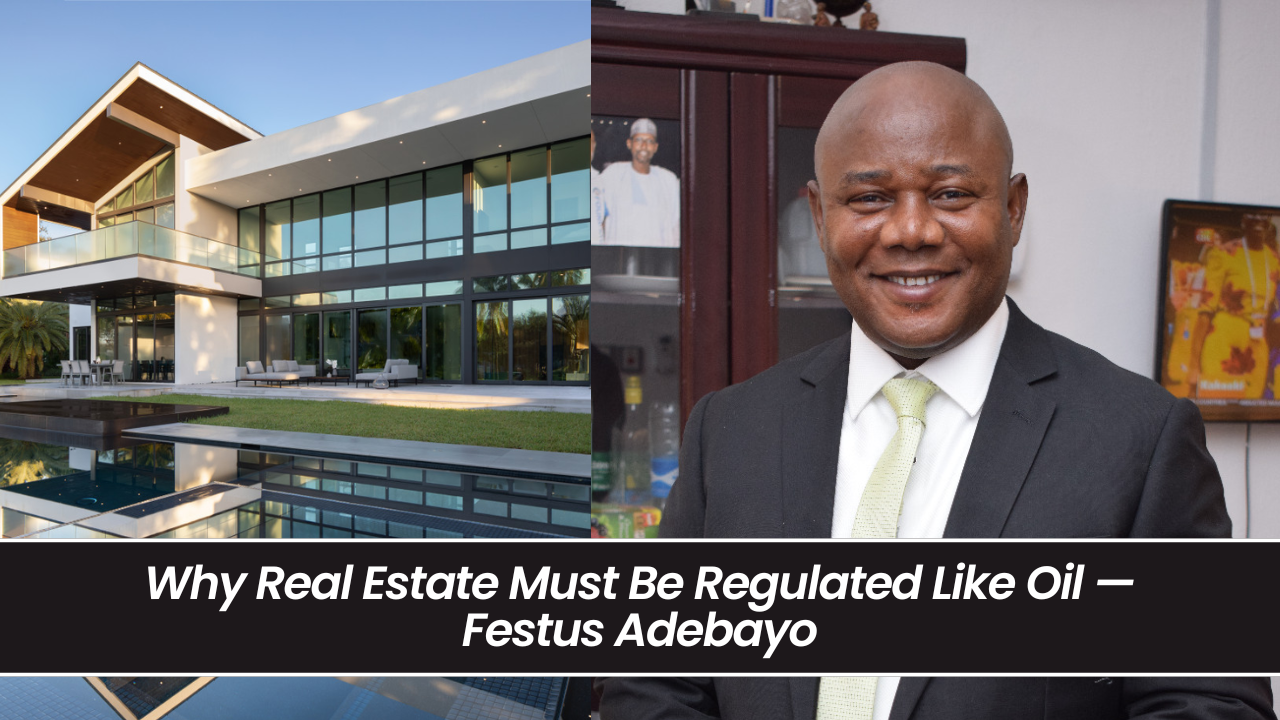BUSINESS

WHY REAL ESTATE MUST BE REGULATED LIKE OIL — FESTUS ADEBAYO
Mr. Festus Adebayo, a lawyer and Executive Director of the Housing Development Advocacy Network (HDAN), also serves as the Lead Promoter of the Africa International Housing Show (AIHS). In this interview with DAYO AYEYEMI, he discusses the need for strong partnerships between the government and credible developers to provide low-income housing, solutions to tackle land grabbing in the FCT, and what stakeholders can expect from AIHS 2025.
What makes a real estate developer credible?
Credibility is judged by results. A reputable developer is one with a proven track record—actual estates with infrastructure and residents who can verify their claims. Credible developers fulfill promises, maintain transparency, and have an office, structure, and financial capacity. A developer who collects money but disappears or doesn’t deliver is not credible.
How can government and private developers work together to promote affordable housing?
Government support is essential. Without it, it’s tough for private developers to serve the low-income segment. The government should ease access to land, reduce bureaucratic costs, and support mortgage systems. Developers often bear the cost of roads, transformers, and other infrastructure, which inflates housing prices. There should be incentives like tax waivers and reduced land costs to truly lower housing prices.
How can land grabbing in the FCT be addressed?
The FCT needs a Real Estate Regulatory Department, like the one in Dubai, to oversee and license developers. This department should ensure that only capable developers with verified land documents can operate. Developers should deposit funds with the government as proof of commitment. Subscribers must be protected, and fraudulent developers punished—not shielded by bribery. The National Assembly and state governments must support regulations, similar to Lagos State’s real estate agency.
Why should the government allocate land directly to real developers?
Developers with capacity and proven performance should receive direct land allocations. Many developers wait for years to access land through official channels, while politically connected individuals acquire land and resell at inflated prices. Direct allocations will cut costs and boost employment—engaging bricklayers, carpenters, and other skilled workers. Giving land to those who actually build will positively impact the economy.
What role is HDAN playing in real estate advocacy?
HDAN has consistently pushed for reforms in the housing sector. Its advocacy has helped grow the real estate sector in places like Lagos and Abuja. The network is working to expose scammers and support genuine developers. They’ve even formed a lobby group to push for a regulatory body in the FCT, insisting real estate must be taken seriously. Many people have lost money to fake developers who collect payments without delivering infrastructure.
What’s new for the 2025 Africa International Housing Show (AIHS)?
The 19th edition of AIHS will be held from July 27 to August 1, 2025, at Transcorp Hilton, Abuja, in partnership with the Federal Ministry of Housing and Urban Development. The theme, “Reimagining Housing Through Innovation, Collaboration, and Policy,” focuses on land reform, innovation, and sustainable housing.
AIHS 2025 aims to open access to land, promote local building material production, and accelerate affordable housing. Honourable Minister Arc. Ahmed Dangiwa will serve as the Chief Host.
Who will participate?
Over 21 countries, 400+ exhibitors, and thousands of visitors—including developers, construction experts, policy leaders, and financiers—are expected. The event will drive partnerships between Nigerian free zones and global investors, targeting job creation and local manufacturing.
Policy discussions with governors and commissioners will address land accessibility, titling, and housing development. Backers include Dangote Cement, IFC (World Bank), AUHF, Brains & Hammers, Lafarge, FMBN, and delegations from Dubai, China, the UK, and Italy.
Professional partners include REDAN, AHCN, NITP, NIA, NIOB, and CORBON.
"This represents a significant development in our ongoing coverage of current events."— Editorial Board









